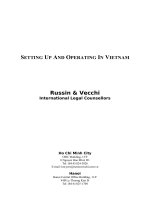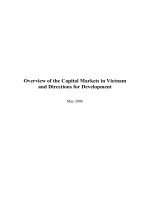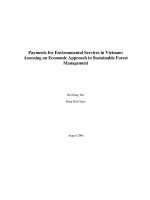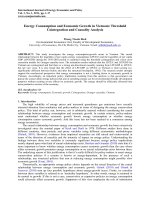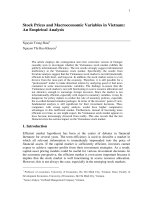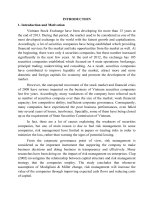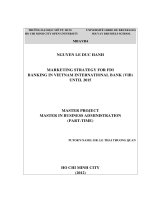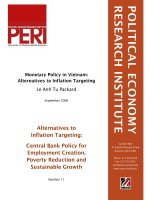FDI INFLOW IN VIETNAM (TCQT)
Bạn đang xem bản rút gọn của tài liệu. Xem và tải ngay bản đầy đủ của tài liệu tại đây (248.03 KB, 9 trang )
MINISTRY OF EDUCATION AND TRAINING
UNIVERSITY OF ECONOMICS HO CHI MINH CITY
FACULTY OF FINANCE
PRESENTATIONS: INTERNATIONAL FINANCE
FDI INFLOWS IN VIETNAM
Full name: Trần Thị Thanh Xuân
Student’s ID: 31181024134
Class: FNC03-K44
Ho Chi Minh city, 2020
INTRODUCTION
Direct Foreign Investment (FDI) is a very important factor in the
development of Vietnam's economy today. We cannot deny the
positive that FDI brings to Vietnam such as: adding investment
capital, boosting exports, reducing unemployment, ... Thanks to
the contribution of FDI, Vietnam's economic growth rate
increase over the years. FDI inflows in Vietnam is growing
strongly over the years based on total registered capital and
implemented capital.
Figure 1: FDI inflows in Vietnam (2000-2018)
(total registered capital and implemented capital)
Source: GSO (2000-2018)
1.
THE KEY POSITIVE EFFECTS OF FDI INFLOWS IN
VIETNAM
1.1. Additional source of social investment capital
From the data in Table 2, it is found that the investment capital
by economic sectors according to the structure of the state
economy decreased over the years. The share of investment
capital from the state economic sector decreased by 33%
(59.1% in 2000 to 33.1% in 2018). In contrast, the non-state
economy and the foreign invested sector tended to increase
steadily and stability. Foreign investment sector accounted for
18% of total investment in 2000, it increased by 23.4% in 2018,
creating the potential of capital, leading to technological
innovation.
Figure 2: Structure of Vietnam's social investment capital
(2000-2018)
Source: GSO
1.2. Improve exports
Figure 3: Structure of Vietnam exports of goods (2000-2018)
Source: GSO
It is easy to see that exports in the FDI sector account for
almost 50% of the total value, clearly seeing the high
competition compared to the domestic sector. Some items of
Vietnam are known for FDI: electronic components, phones,
office computers ... The results show that FDI plays an
important role, especially when Vietnam joins the WTO and
most of the products are exported.
“Data from the General Department of Vietnam Customs and
the Ministry of Industry and Trade show that, from the
beginning of the year to the end of October 15, 2019. The total
export turnover of the whole country reached US $204.9 billion
while the total value of imported goods reaching $198.1 billion
USD Remarkably, FDI enterprises had import and export value
up to $255.3 billion USD, accounting for 63.3% of total import
and export turnover of the country. Exports of this group
reached US $140.3 billion, up 4.8% over the same period and
accounting for 68.5% of Vietnam's total merchandise export
value. FDI enterprises amounted to $25.4 billion USD ...”, Tien
Phong’s newspaper.
1.3. Reducing unemployment, create jobs
Currently, there are many factories, enterprises and companies
led by foreign investors in Vietnam, creating more job
opportunities. In 2017, FDI created more than 2 million direct
jobs, not to mention indirect associations.
According to JobStreet's first recruitment overview market in
the first half of 2018, job search for job opportunities in foreigninvested enterprises increased 10 times compared to the same
period in 2017.
1.4. Technological innovation, improving competition
Vietnam is a developing country, so technology transfer is of
special importance and contributes to the development of
national internal resources, quickly accomplishing the goal of
self-research and testing. Some industries such as: oil and gas,
construction, hotels, offices for lease are being promoted and
enhanced by FDI in our country. Therefore, our country has
created many new products and imported restrictions due to
innovation and advanced equipment to promote development
compared to other countries.
In the market, almost high-quality products, beautiful designs,
attracting a large number of customers are created by FDI
enterprises.
1.5.Improve the level of business management and
administration
Foreign companies are heavily influenced by professionalism
abroad, so the foreign invested sector have a well-known team
of directors and managers that help educate employees with
high qualifications, transfer experience and intensive job
training creates the best job efficiency. In addition, Vietnamese
workers can learn methods and technology from foreign
managers to accumulate experience and knowledge for
themselves, create trust to deal with jobs and businesses for
us.
2.
THE KEY NEGATIVE EFFECTS OF FDI INFLOWS IN
VIETNAM
2.1. Unreasonable investment structure
We often call for foreign investment to call for capital, modern
technology, lots of experience ... to create a balanced and
modern economy. But learning to put capital in places we need
very little, because these are areas of low profitability and high
risk of creating the imbalance we want. The imbalance is
expressed on three angles: an imbalance in FDI into the three
industries of industry, agriculture and services; imbalance in
internal investment in each industry; irrationality in the regional
investment structure.
2.2. Inheriting outdated technology, lack of modern
technology
“Vietnam effective technology transfer from FDI is very low and
tends to lag behind other countries in the region such as
Thailand, South Korea ... even ranked behind Laos and
Cambodia”, taken from newspaper.
Figure 4: technology transfer rate of FDI project in Vietnam
Note:
5%: High technology
10%: Domestic value
15%: Medium technology
70%: Poor technology, backward
Source: />
The goal of our country in attracting foreign investment is to
create a new and modern transfer technology to create quality
and competitive products in the market. But what is the
weakness, foreign investment has moved into our country with
outdated technologies that are not used much in their
countries. According to Figure 5, accounting for 70% of
technology transferred to our country is not new and outdated
technology, Vietnamese workers are handed over simple
stages, requiring unskilled labor. The amount of technology we
desire for foreign investment is a modest 5%. Most foreign
investors in Vietnam are Asian countries, so technology transfer
is low. Investors from the United States and Europe account for
a small proportion of the Vietnamese economy.
2.3.Adverse impacts on the environment
In developing countries, the tax rates for industries polluting
the environment are low, and Vietnam is also an exception. Part
of the pollution is caused by outdated technology, old
machinery and equipment emitting into the environment toxic
substances that pollute the air, water, soil and noise. Policies to
control foreign investment are still limited, lax management,
implementation of regulations on environmental protection to
cope, resulting in great economic losses and lives of people
such as: Vedan Company discharges water untreated waste
into rivers, Formasa discharges toxins that kill fish...
2.4.Conflict between investors and employees
In 2017, the whole country had 314 strikes and suspension of
collective work in 36 provinces and cities, which occurred
mainly in FDI enterprises (accounting for 82.1%). According to
the report of the Vietnam General Confederation of Labor, the
number of incidents related to wages, income and minimum
wage adjustments account for a high proportion (accounting for
54.1%). Some industries with low salary and income occurred
many strikes such as: Textile and garment (162 cases,
accounting for nearly 51.8%); 71 cases of leather shoes
(accounting for nearly 22.5%).
3.
SUGGESTIONS TO MITIGATE THAT NEGATIVE EFFECTS
OF FDI INFLOWS IN VIETNAM
− Perfecting the system of laws, policies and management
of the state openly and intelligently while promoting
investment while ensuring quality efficiency, encouraging
high technology and preventing projects of poor quality.
− Do not accept excess technology projects or
environmental pollution. strengthen inspection and control
of waste disposal processes, remedies and technology
transfer import processes to minimize poor and outdated
technologies so as not to become old storage yards. Ask
businesses to report honestly to find the best solution for
both parties to achieve high economic efficiency.
−
−
−
Protect the rights of employees and prevent law violations
of the business owner. To force the head of the enterprise
to be responsible for the violations of the implementation
of the law.
Improve staff appraisal FDI projects, training a
fundamental and systematic professional qualifications,
knowledge and experience realistic and qualified
professional ethical appraisal price.
Invest in infrastructure, enhance investment promotion
activities, expand and consolidate diplomatic relations
with other countries to create confidence in modern
technology investment in our country.
REFERENCE
o
All statistics are taken from official sources of the General
Statistics Office for the years 2000-2018, official website:
/>o />o />o

